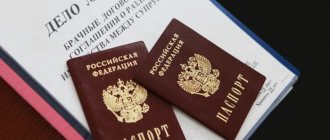Receiving an inheritance by force of law or by will is a slow process. In the most favorable scenario, you will be able to receive your share of the deceased relative’s property only after six months. And if a dispute arises between the heirs, then the division of the inheritance may drag on for several years, filled with litigation. Especially if inheritance by right of representation and hereditary transmission are provided. Let's consider what it is and how it affects the division of inheritance between relatives.
What is inheritance?
There are many explanations for the concept of inheritance, but in a general sense, inheritance is the transfer of property and liability rights from a deceased person (testator) to other legal entities (heirs). Despite the simplicity of the definition, this is a rather complex legal mechanism, which is regulated by Part 3 of the Civil Code of the Russian Federation.
In order to more easily understand this phenomenon, it is necessary to imagine a certain person who is the owner and the debtor. After his death, all rights/obligations actually and legally cease, but the property, obligations, and debts that previously belonged to him cannot disappear into thin air, which is why an inheritance procedure was invented, which in its specificity resembles “succession.”
In Art. 1110 of the Civil Code of the Russian Federation, the legislator indicates that the inheritance procedure is based on the principle of “universal succession ,” that is, the heir assumes all legal relations of the deceased predecessor. This means that inheritance cannot be implemented partially, but only in a holistic and unchangeable form.
Concept and meaning
The concept of inheritance is briefly described in Article 1110 of the Civil Code. This is, first of all, the transfer of various kinds of rights and obligations to another person, who is most often associated with certain relationships with the deceased testator. Inheritance is necessary as a principle for protecting property rights in the event of the death of the owner. As a result of this event, all his rights as a subject are lost, therefore the legislator determined the permissible circle of heirs.
On the other hand, inheritance allows a still living individual. a person can independently dispose of his property by writing a will. In short, we can say that the institution of inheritance protects the property, property interests and will of an individual. In any case, the importance of the institution of inheritance is very great, since thanks to this phenomenon property arises.
Who are the heir and testator?
Only 2 subjects participate in hereditary relations:
- testator;
- heir.
The testator is an individual. a person whose death is documented and officially confirmed. During his lifetime, he was supposed to have certain property and obligations, which together constitute the so-called “inherited estate.” In this case, the very fact of the legal capacity, age, and citizenship of the testator is unimportant, since in any case his death gives rise to inheritance relations.
Important! The testator is always an individual. person, since other subjects of law cannot inherit anything. Identical legal phenomena have a different name and a completely different legal procedure.
The legislator defined a wide range of heirs, who could be not only ordinary citizens.
According to Article 1116 of the Civil Code of the Russian Federation, potential heirs are:
- living citizen;
- entity;
- state;
- The subject of the Russian Federation;
- municipalities;
- foreign countries;
- international organizations.
Read more about testators and heirs in this article.
Are there any updates to inheritance legislation in 2020?
Important! Please keep in mind that:
- Each case is unique and individual.
- A thorough study of the issue does not always guarantee a positive outcome. It depends on many factors.
To get the most detailed advice on your issue, you just need to choose any of the options offered:
- Use the online chat in the lower corner of the screen.
- Call: Federal number: +7 (800) 511-86-74
A special normative act that would define inheritance issues, including the order in which people enter into inheritance, has still not been adopted. Inheritance relations are specifically described in Part 3 of the Civil Code. Thus, his chapter 61 covers general issues of inheritance. Chapter 62 describes in detail how to receive an inheritance if a will is drawn up, and Chapter 63 describes how to enter into rights under the law.
There were no major changes to these chapters in 2020. The provisions on inheritance issues are so fully consistent with existing reality and are described in detail in the law that they do not require adjustments or additions.
What is inherited?
Inheritance relations are quite extensive, so the transfer of all property rights can be carried out in relation to various types of property and obligations. This is the object or core of such legal relations.
According to Article 1112 of the Civil Code of the Russian Federation, the following are traditionally inherited:
- things (money, valuables, clothing, equipment, technology, technical devices, etc.);
- property (movable/immovable, including non-residential);
- property rights;
- various kinds of obligations.
It is worth noting that not only the property and material things of the testator are inherited, but also obligations and debts. This means that the heir, within his share of the inheritance, assumes the following obligations:
- credit;
- collateral;
- debt (payment of utility services);
- tax, if there is debt;
- contractual (purchase and sale, rent).
Video about accepting debts along with an inheritance:
All debts are inherited jointly, that is, creditors can make claims either against 1 heir or against all heirs combined.
Reference! According to Art. 1112 of the Civil Code of the Russian Federation, debts and obligations that are closely related to the personality of the deceased person are not inherited: alimony; causing harm to life/health, etc. Intangible benefits (life, health, reputation, honor) can also be included in this category.
Moral rights that lack a material component are not inherited, but there are exceptions:
- exclusive rights to a creative object, which are inherited in accordance with Article 1283 of the Civil Code of the Russian Federation;
- protection of exclusive rights (Article 1267 of the Civil Code of the Russian Federation).
We talked in more detail about what is included in the inheritance and what is not in this article.
Separate groups of assignees
Alienation of property by law based on the degree of relationship is not a sole and binding right that limits the opportunities of other family members, or allows persons who have violated the law to inherit property.
In addition to the applicants included in the priority groups, there are separate categories of citizens who are subject to different rules of inheritance in accordance with the law.
Heirs by right of representation
The right of representation is the right to inherit a share of property by descendants in the event of the death of relatives (before the death of the testator or simultaneously with him), who are the direct beneficiaries of the queue.
Inheritance in accordance with the right of representation is provided for by law in the 1st, 2nd, 3rd stages:
- Grandchildren (in case of death of a son or daughter).
- Nephews (in case of death of a brother or sister).
- Cousins (children, deceased uncles or aunts).
The share of the deceased mother or father is distributed among the descendants in equal parts.
Example
After the citizen's death, he was survived by his wife and daughter. During the life of the deceased, his son dies, leaving behind a wife and two children. In this case, the inheritance will be distributed as follows (we assume that there is no will, and the marital share has already been removed from the inheritance estate):
- spouse – 1/3;
- daughter – 1/3;
- children of the deceased son - 1/6 each.
Disabled dependents
If there are disabled citizens from among the relatives specified in Articles 1143-1145, who were dependent on the testator for at least a year (and it does not matter where they lived), then they inherit on an equal basis with the heirs of the conscript line.
Example
The deceased man is survived by his wife and two sons. For the last 15 months, the deceased's paternal grandmother was dependent on him. Taking into account all the circumstances, the inheritance mass will be divided among all specified persons in equal shares of 1/4 each.
Hereditary transmission
Another situation that may arise in the process of inheritance is considered separately by law, Article 1156 of the Civil Code of the Russian Federation - hereditary transmission.
In the event of the death of a direct heir before the acceptance of the inheritance, subject to the opening of an inheritance case, the right to accept passes to his direct successors by law (or by will). True, in this situation, acceptance as a mandatory share is not transferred to his relatives.
If the beneficiary has already submitted an application and did not have time to join, the property is included in his estate and distributed among his direct heirs on a general basis.
Who is entitled to the obligatory share of the testator's property?
Legislation protects the rights of a certain category of citizens in the form of allocating them a mandatory share of the inheritance mass. This rule applies to dependents who are close relatives:
- disabled spouses, parents, children;
- minor children.
Disability is understood as the inability to perform labor functions due to age (pensioners) or health reasons (disabled people). Children under 18 years of age are considered minors. In the absence of other relatives, dependents inherit property as 8th-degree successors.
This category of citizens has the right to claim an inheritance regardless of the instructions in the testamentary act (if any), even at the expense of reducing the shares of other beneficiaries. But only ½ of the part that would have belonged to them if a document had not been drawn up that recorded the will of the deceased regarding the principles of distribution of property.
Is it possible to be deprived of an inheritance in case of distribution according to law?
Even if, according to the law, the beneficiary is the heir of the 1st (or other priority), he may be recognized by the court as unworthy, without the right to receive the due share of the deceased’s property.
In judicial practice, there are the following reasons why relatives may be deprived of their due part of the property:
- failure to fulfill obligations imposed by the court in relation to the deceased;
- carrying out illegal actions against the testator or other interested parties (blackmail, threats, beating, deception, etc.).
Deprivation of rights to inheritance is possible if there is evidence of violations or criminal acts.
Content of the phenomenon
The basis of inheritance is the legal and factual rights and obligations of all parties involved in the matter. If the testator is alive, the heirs have no rights. They cannot make any demands at this time.
Only after the opening of an inheritance can we speak of the emergence of hereditary relations. The testator always has the right to use the powers of the will or leave everything as is. After the death of the testator, certain persons are transformed into heirs who are required to make the following decisions:
- accept inheritance;
- refuse him.
Law in art. 1153 of the Civil Code of the Russian Federation states about legally acceptable methods of accepting an inheritance; therefore, the heir has the right to choose the most suitable option for him.
Video about what it means to “accept an inheritance”:
In turn, officials (notaries) have an obligation to help a person accept an inheritance or refuse it.
Important! After going through the procedure of accepting an inheritance in a legal sense, the heir becomes the owner. This means that in addition to property rights, the heir will also bear all associated debts/responsibilities.
Second stage
If there are no heirs from the first line, then by law the entire inheritance goes to relatives from the second line.
Example: after the testator died, there was no will. At the same time, he has a brother from the first stage, but even before the opening of the inheritance he dies. This brother had 3 children and a sister .
The inheritance will be divided between them as follows:
- 50% of the inheritance goes directly to the brother's sister;
- the remaining 50% is divided between 3 children, namely 1/6 of the share for each child.
What is property?
Almost all things that have a material appearance are subject to inheritance, but real estate and expensive movable property are of particular value. Such things traditionally include:
house;- apartment;
- land plot;
- non-residential premises;
- construction;
- building;
- land with a house;
- jewelry.
- car or any other vehicle;
- money, stocks, bonds, bank deposits, accounts;
All this property is of considerable value, so they are the subject of inheritance. The legislator does not prohibit inheriting any other things that do not represent a high monetary value, but the main condition is that they must be material.
Read about the inheritance of certain types of property in our article, and here we talked about what escheat property is.
Will and its types
A will is a written expression of the will of a person aimed at disposing of his property in the event of death. This is a common type of inheritance and the right of a person to determine the future fate of his property.
Reference! The testator is practically not constrained by any restrictions and can indicate any persons in the document, but Article 1149 of the Civil Code of the Russian Federation contains significant exceptions to the rules.
The testator writes a will in free form, signs it and submits it to a notary for certification. However, at any time the document can be revoked or a new declaration of will can be drawn up. Here the free will of the person completely dominates.
The legislation provides for the following types of wills:
- open;
- closed;
- in case of emergency.
An open will is an ordinary written disposition of one's property.
Its contents are no secret to the notary himself and potential heirs. After certification of the document, one copy of the will remains with the notary, and the other in the hands of the testator.
A closed will is written secretly and in a closed envelope, the contents of which are ideally known only to the testator himself. The procedure for certifying a closed will must comply with the strict rules specified in Article 1126 of the Civil Code of the Russian Federation.
Video about how a closed will differs from an open will:
In exceptional cases, if the testator finds himself in an emergency situation, then he draws up a will in writing and by hand on any paper/digital medium in the presence of two witnesses (Article 1129 of the Civil Code of the Russian Federation).
Important! The legislation also provides for other types of expression of the will of a person, equivalent to an official will. These include drawing up a document in a hospital, nursing home, on an expedition, on a ship, in military units, or in prison.
Accordingly, the witnesses of such documents: chapters. doctors, heads of institutions, ship captains, heads of expeditions, commanders, heads of colonies.
Currently, a testator or heir can contact any notary office to perform certain actions, but previously there was no such opportunity, so notaries served strictly defined areas of the city.
In 2005, a unified information system “Inheritance Without Borders” appeared, invented by a Moscow notary office. This is an electronic information database where all the hereditary affairs of the city of Moscow were stored. Thanks to this development, people could contact any notary office in the capital without being tied to their district/street.
Later, this system was introduced into other regions of the country, but today it has lost its relevance. Federal Law No. 457 introduced fundamental changes to the work of the notary, creating a more promising innovation - the Unified Notary Information System (UIS). It became operational in 2014 and contains data on all wills registered in the Russian Federation. Citizens can freely contact any notary in the country to resolve certain inheritance issues.
How to register an inheritance?
Here are step-by-step instructions.
- We contact a notary and find out whether the deceased citizen has drawn up a will. If it has been formalized and the property according to it is transferred to another person, then further actions to acquire property in most cases will be in vain. The only exceptions are situations when disabled husbands, wives, children and other dependents claim the inheritance. They will be able to get their due share under any circumstances.
- We collect the necessary documents according to the list.
- We visit the notary chamber - the one you need to contact depending on the place of last registration of the deceased. Let's get acquainted with the price list of the cost of specialist services. We pay the amount for drawing up an application by a notary.
- We ask the notary to issue an application for opening a case. After studying all the documents, the notary begins to fill out the form together. In addition, the notary will certainly find out who else can claim the inheritance and how to find them.
- We pay a fee for opening an inheritance case by a notary. If a close relative of the testator, a representative of the 1st or 2nd priority, applies, then the duty is three tenths of a percent of the value of the acquired property. If it’s another, not close person, then more, six tenths of a percent. The limits of fees for such legal action have also been established: 100,000 rubles for loved ones and 1,000,000 rubles for other successors. To calculate the percentage of property as a duty, you need to know the price of the inherited property. Special appraisal organizations are engaged in determining the value of real and movable objects. Also, in addition to the market price of the property, you can use cadastral and inventory values, which are significantly lower, for assessment. The total value of the inherited property is less, which means the amount of duty paid will also be less.
- After six months, we again contact the same notary with an application to issue a document on the right to inheritance. This may be one certificate for all successors, indicating the shares due to each, or there may be several personal certificates.
- We register our property rights with certain authorities depending on the type of property: the Registration Chamber, the State Traffic Safety Inspectorate or banks.
Required documents
The following documents must be submitted to the notary:
- a document confirming the death of a person - the testator. This can be either a death certificate obtained from the registry office, or a court decision declaring a person dead. Let us remind you that the registry office does not charge a fee for registering the death of a person.
- documents about the last place of residence of the deceased citizen, for example, a certificate from the management company or passport office. These documents are necessary, since it is on the basis of them that the heirs select the notary chamber.
- documents establishing family and other hereditary ties with the deceased: passports, birth certificates, marriage certificates, adoption certificates, etc. The further the relative is from the deceased, the more documents confirming the relationship the successor will have to collect.
- documents indicating the presence of property in the property of the testator: certificates from the Registration Chamber for an apartment, a car registration certificate and others.
- power of attorney, if the heir deals with the issue not personally, but through his representative.
Having carefully examined all the documents submitted by the applicant, the notary helps fill out an application for opening of inheritance. Forms are available in every notary office (). After six months, the notary issues a document on the right to property received by inheritance.
Thus, the procedure for obtaining an inheritance by law is spelled out in detail in the Civil Code. The main rule when establishing the circle of heirs is to observe the order. Queues are also prescribed by law. There are eight of them in total. The principle of succession is based on the relationship of the successors with the deceased testator. Representatives of each subsequent queue have the right to claim the inheritance only if there are no persons from the list of previous queues.
What types of documents exist in the Russian Federation?
Inheritance in the Russian Federation is a legal transfer of legal personality from a deceased person to a living heir. The legislation provides for 2 types of inheritance according to the method of transfer of property :
- law;
- will.
Video about inheritance by law and by will:
The law establishes 8 lines of inheritance, which only further complicates the matter. Thanks to a will, the testator can reduce the number of heirs and transfer valuable things to any subjects.
Video about the inheritance acceptance queue:
When does it take effect?
The opening of inheritance legally and actually begins after the death of the testator, that is, until this moment, inheritance relations have not yet been activated. If the testator is still alive, the heirs cannot challenge the will or make any claims.
In other words, the process of opening an inheritance begins from the date of death of a certain person . After this moment, the heirs must officially accept it. The legislator gives a specially allotted period for this, which for your own good should not be missed.
We talked in more detail about opening and accepting an inheritance here.
Features of the right of representation
If a relative died at the same time as the testator or in the period before the inheritance was opened, his share will be transferred by right of representation to the heirs. The right of representation applies if the relative was a proper heir during his lifetime.
Let's take a closer look. That part of the deceased’s property that was intended for the relative will be divided into equal shares among his heirs
"Example. The heirs after Igor’s death will be daughter Marina and son Andrei. The son died two months later. His share (½ part) will be divided between his two daughters Svetlana and Irina. As a result, Marina will receive ½ of Igor’s entire property, Svetlana ¼ share, Irina ¼ share.”
What is needed to obtain ownership?
It is not enough to simply be an heir in the legal sense of the word, since certain actions must be taken to enter into the inheritance. What exactly needs to be done and in what time frame? The law in Article 1154 of the Civil Code of the Russian Federation defines a period of 6 months to contact a notary with an application and a package of necessary documents .
Missing this deadline can only be restored in court, but interested parties must have good reasons for this. After entering into an inheritance, a person applies to Rosreestr to obtain a special extract on ownership. Ideally, only after this point can a person enter into any transactions. Before selling any items, you must be completely sure that no one else is laying claim to the property.
As a result, we can say that only a full-fledged procedure for accepting an inheritance gives the right to sell property. Until this moment, nothing can be done, since when registering a transaction, you must present an extract from the register.
Note! When selling inherited property, a special tax is levied, provided for in Article 220 of the Tax Code of the Russian Federation. Exemption from its payment is the right of ownership for a period of more than 5 years. And then only we can say that the sale brought profit.
Scheme of succession according to law after the death of the testator
Relatives of a deceased person have the opportunity to receive his property based on the degree of relationship. A multi-step ladder, where those closest have priority over those farther away.
Legitimate applicants are divided into so-called queues :
- The first is the father, mother, children, and necessarily the wife or husband of the deceased.
- The second is made up of brothers and sisters, as well as grandparents.
- The third is uncles and aunts.
- The fourth is ancestors - great-grandfathers and great-grandmothers.
The fifth - seventh include cousins, also great-grandparents, great-grandchildren, as well as stepdaughters, stepsons, stepfathers and stepmothers and other distant relatives.
Dependents who lived with the deceased belong to the eighth category . Property is distributed equally among relatives of the same line.
The testator can bequeath his property to other people. In this case, the legal successors risk losing their inheritance if they cannot defend it in court.
What problems might arise?
In inheritance relations, various kinds of problems often arise that no one expected at first glance, since inheritance is a very complex procedure from a legal point of view. Both by law and by will, future heirs may face the following situations :
- The presence of a large number of legal heirs, which complicates the procedure for transferring property rights due to various claims. This fact also reduces the inheritance share of all participants.
- An invalid will, recognized as such in accordance with Articles 168-179 of the Civil Code of the Russian Federation.
The appearance in the case of obligatory heirs, whose interests cannot be ignored, and also excluded from inheritance relations in accordance with Art. 1149 of the Civil Code of the Russian Federation.- Missing the 6-month deadline to contact a notary due to ignorance of the law. This is not a valid reason for the court, so it will be difficult to restore the terms.
- Recognition by the court of interested persons as unworthy heirs in accordance with Article 1117 of the Civil Code of the Russian Federation, if they, for example, did not pay alimony for the maintenance of the deceased person.
- The fact of relationship with the testator often requires serious evidence. For example, this happens if a child was born out of wedlock or the testator is simply not indicated as a parent in official documents.
You will find more information about the problems of inheritance by law and will here.
Mandatory heirs
The category of obligatory heirs, whose rights are protected by the law, includes:
- children under the age of majority;
- parents and relatives of the testator who have disability groups and have retired to a well-deserved old-age pension.
Important! In the case when the heirs fall into this particular group, then, even if there is a will that does not give them anything from the inheritance, they are guaranteed to receive their obligatory share in the inheritance, either by law or by going to court.







